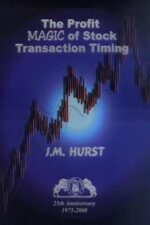Mastering the Market Cycle: Getting the Odds on Your Side
$13.03
Mastering the Market Cycle: Getting the Odds on Your Side by Howard S. Marks is an essential guide to understanding one of the most influential forces in investing: the recurring cycles that shape markets. Marks, co-founder of Oaktree Capital and one of the most respected voices in finance, brings decades of experience and insight to explain why markets move in waves of optimism and pessimism, boom and bust, and how investors can position themselves to thrive by recognizing these patterns.
Rather than relying on predictions or short-term speculation, Marks emphasizes the importance of cycle awareness as a tool for making better long-term decisions. He explores various types of cycles—economic, credit, investor psychology, and business—and demonstrates how they interact to create periods of opportunity and risk. By learning to identify where we are in a given cycle, investors can tilt the odds in their favor, avoiding excessive risk during euphoric times and seizing opportunities when fear dominates.
What makes this book particularly valuable is Marks’s ability to distill complex concepts into practical wisdom. He shares historical examples of market bubbles, crashes, and recoveries, showing how cycles repeat, though never in the exact same way. His perspective encourages readers to focus not on forecasting precise outcomes but on understanding probabilities, risk levels, and market sentiment.
The book is as much about mindset as it is about market analysis. Marks stresses the need for patience, discipline, and humility—qualities that allow investors to withstand volatility and capitalize on cycles over time. His emphasis on second-level thinking—looking beyond the obvious and questioning consensus—provides readers with a competitive edge in navigating uncertain environments.
Mastering the Market Cycle is a must-read for both seasoned professionals and individual investors who want to elevate their decision-making. It equips readers with the tools to recognize the rhythms of markets, avoid common traps, and invest with greater confidence. In a world where cycles are inevitable, Marks shows how the thoughtful investor can turn them from a source of risk into a powerful advantage.
Contents:
- Why Study Cycles?
- The Nature of Cycles
- The Regularity of Cycles
- The Economic Cycle
- Government Involvement with the Economic Cycle The Cycle in Profits
- The Pendulum of Investor Psychology
- The Cycle in Attitudes toward Risk
- The Credit Cycle
- The Distressed Debt Cycle
- The Real Estate Cycle
- Putting It All Together—The Market Cycle
- How to Cope with Market Cycles
- Cycle Positioning
- Limits on Coping
- The Cycle in Success
- The Future of Cycles
- The Essence of Cycles
Mastering the Market Cycle: Getting the Odds on Your Side By Howard Marks pdf
| Author(s) | |
|---|---|
| Format | |
| Pages | 257 |
| Publication Year | 2018 |
19 reviews for Mastering the Market Cycle: Getting the Odds on Your Side
Only logged in customers who have purchased this product may leave a review.










Nova King (verified owner) –
“Mastering the Market Cycle: Getting the Odds on Your Side” by Howard Marks is a must-read for any investor who wants to gain a deeper understanding of the cyclical nature of financial markets.
Marks draws on his decades of experience as a successful investor to provide a comprehensive overview of market cycles, including the factors that drive them and the common mistakes that investors make during each phase of the cycle.
One of the things I appreciate about this book is that it is written in a clear, concise manner that is accessible to both novice and experienced investors. Marks uses real-world examples and analogies to illustrate his points, making complex concepts easy to understand.
The book is divided into three sections, each of which focuses on a different aspect of market cycles. The first section provides an overview of the concept of cycles, including the different phases and the drivers of each phase. The second section delves into the psychological and emotional factors that influence investor behavior during market cycles, including the role of greed and fear. The third section offers practical advice on how to invest during each phase of the cycle, including strategies for mitigating risk and capitalizing on opportunities.
Overall, I found “Mastering the Market Cycle” to be an insightful and thought-provoking read. Marks’ wealth of experience and expertise shine through in every chapter, and his advice is grounded in sound principles that are backed by decades of market data. Whether you are a novice investor or a seasoned pro, this book is an invaluable resource that will help you navigate the ups and downs of financial markets with greater confidence and success.
Lillian Adkins (verified owner) –
I actually like the content of this book. However, I was really put off at the very beginning when Howard Marks ‘apologizes’ in advance for his consistent use of the pronoun he in the book. As a woman with a career in computer and data science, I have really struggled with subconscious bias against my abilities in math and science due to messages I have received. When a book by a hugely influential person, such as Mr. Marks, uses the male pronoun exclusively it is subtly sending the message that finance is a playing field exclusively for men. Messages like this are received and stored; they teach women this isn’t an arena for us, which shows up in the number of women who choose to enter the field of finance. Shame on you, Mr. Marks! You had the chance to be a positive influence and chose not to due to pure laziness. (I’m giving you the benefit of the doubt here…). This is especially disappointing because early on in the book he talks about the influence of psychology and its effects on markets so clearly he understands how psychology works. To have missed this obvious point about subconscious bias in the writing of his book is deeply disappointing.
Azalea Lin (verified owner) –
One of the best books on investing ever written. Easy to understand, engaging, and densely packed with information. A must read for any serious investor.
Ledger Townsend (verified owner) –
Marks keeps it simple here. The only way for most of us to outperform the market is to be aware of where investors current mindset is at regarding how much they are willing to pay for assets.
Jamison Rivera (verified owner) –
There wasn’t any actionable information anywhere in the book. I’m sure it took effort and seemed like there was an editor, but there was literally nothing to inform activity. Saying “there are cycles” over and over again doesn’t help prove a point. My hope in reading this was that there would be quantified, discrete, cycles with evidence. Barring that, a method for identifying cycles from sets of data. I’m sure the author has many talents in these areas and it would have been a more useful book if those talents had been captured in the book.
Felicity Christian (verified owner) –
v useful book
Mabel Moon (verified owner) –
This is a great book with tons of details and explanations of how the economy runs through cycles in all the areas not just the stock markets. Definitely worth reading and probably worth reading twice. Lots of great information.
Brylee Pitts (verified owner) –
This is a must read book for all investors, period. However, I thought it was a bit to repetitive (the book in its current form could have been half as long). Also, I think the author could have delved into more details about how to actually determine investor enthusiasm (or lack thereof). He does touch on the fact that credit spreads, PE ratios, and cap rates are quantitative tools used to test investor sentiment for extremes, but I think this book could have used a short chapter dedicated to explaining the nuances and pitfalls associated with using such figures to understand where one stands in a cycle.
Nonetheless, this is a fantastic book that has definitely made me a wiser investor.
Austin Robles (verified owner) –
Deep understanding of why markets are driven by psychological manners in addition to technical ones. Good notes to take into consideration for long terms investors.
Clare Baldwin (verified owner) –
Author rambles, nothing is written in an organized format aside from the progression of chapter titles.
Passages/subchapters are written as a disorganized mix of the author’s past magazine articles and his thoughts literally in the moment of writing the book’s manuscript. Only 5-10% of this book’s information was educational.
If you can find a different book about economic market cycles, I suggest you do.
Veda Mata (verified owner) –
Most average investors, like me, have a general understanding of the market forces but lack the skills to connect the dots. This book provides the methodology to put all that disperse knowledge into a coherent process to position depending on the environment.
Great book!
Zainab Farmer (verified owner) –
Unless you are just out of high school, not much of value here.
He clearly didn’t put a lot of effort into this.
Jaiden Sheppard (verified owner) –
Exactly as described. Thank you
Rachel Ruiz (verified owner) –
Excellent, I enjoyed the book.
Victoria McClure (verified owner) –
Mr. Marks explains how all kinds of cycles (economical, credit, real estate, etc.) are formed and how we can take advantage of them to become better investors. This is a great read that can really improove your understanding of the market and help you become a better investor.
Kylo Pena (verified owner) –
Good foundation info
Ray Maddox (verified owner) –
My #1 Book on Cycles.
Trey Khan (verified owner) –
I really liked the book. Possibly a little difficult to apply some of the overturned concepts, but without a doubt a book that opens your mind to thinking about some issues related to the business cycle and its impact on the capital market.
Reese Glass (verified owner) –
Read it.